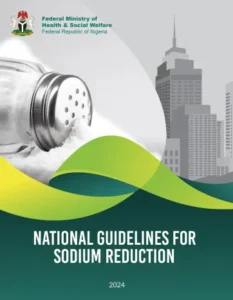Nigeria: High Salt Intake Raises Heart Disease

The Federal Government has raised the alarm over a surge in cardiovascular diseases across Nigeria, blaming it largely on the excessive consumption of sodium—commonly found in table salt and processed foods. This growing health concern was the focus of a recent media training workshop on sodium reduction, held in Abuja and organized by the Centre for Communication and Social Impact (CCSI).
Nigerians Eating Twice the Safe Limit
According to Femi Stephen, Food Safety Lead at the Federal Ministry of Health, Nigerians are consuming more than twice the World Health Organization’s (WHO) recommended sodium intake of 2,000 mg per day—equivalent to just one teaspoon of salt. This, he said, is fueling a rise in non-communicable diseases, particularly hypertension, stroke, and other heart-related conditions.
“Cardiovascular diseases aren’t like malaria that you treat and move on,” Stephen stressed. “They are lifelong challenges that can devastate family finances and affect the economy at large.”
Stephen emphasized that widespread implementation of these guidelines could help reduce the growing burden of preventable diseases linked to high salt intake.
The Silent Killer in Our Diets
Bukola Olukemi-Odele, Programme Lead for Cardiovascular Health at Corporate Accountability and Public Participation Africa (CAPPA), echoed similar concerns. She described sodium as a “silent threat” that’s undermining the nation’s health, often without warning signs until it’s too late.
Read Also: Lexington Church Shooting: Rapper Guy House Identified As Gunman
“Most people don’t realize how much sodium they’re consuming daily,” she said. “It’s in the seasonings we use, the snacks we eat, and processed foods. All of this adds up, putting more people at risk of stroke, heart attacks, and high blood pressure.”
Educating the Media, Informing the Public
In her welcome remarks, CCSI Executive Director Babafunke Fagbemi—represented by Head of Programmes Oluseyi Akintola—reaffirmed the organization’s commitment to improving public health through education and advocacy.
She noted that the workshop aimed to equip journalists with the latest data and communication tools to craft health messages that resonate with diverse audiences, especially on sodium reduction.
“This is about changing narratives,” she said, “and empowering the media to become key players in promoting healthier food habits.”
What You Can Do
Reducing salt intake doesn’t mean cutting out flavour. it means making informed choices. Here are a few simple ways you can lower your sodium intake:
- Read food labels carefully
- Choose fresh foods over processed ones
- Cook with herbs and spices instead of salty seasonings
- Limit consumption of salty snacks and instant noodles
- Taste your food before adding extra salt
Taking these small steps can lead to big changes in your health and help Nigeria combat the growing tide of non-communicable diseases.
Content Credit | Ohida Oluwaferanmi
Image Credit | radionigeria.gov.ng




